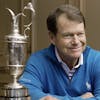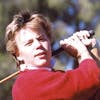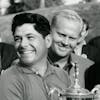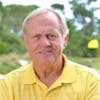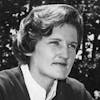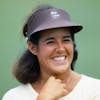Trevor Immelman - Part 1 (The Early Years)

Dive into the inspiring world of golf with the first installment of our five-part series on Trevor Immelman, the 2008 Masters Champion and CBS Golf Broadcaster. In this captivating episode, Immelman joins hosts Mike Gonzalez and Bruce Devlin to unravel the threads of his extraordinary journey from the scenic locales of Cape Town to the hallowed greens of Augusta.
Immelman's narrative begins in the vibrant landscapes of South Africa, where his love for golf ignited as a young boy in Somerset West, nestled between the stunning Stellenbosch wine country and the Strand’s oceanfront. Listen in as he recounts his earliest influences, including the pivotal role his family played in shaping his passion for the game. His tale is a fascinating blend of personal anecdotes, capturing the essence of growing up in a sports-loving nation, and the crucial moments that shaped his path to becoming a golfing prodigy.
Our hosts delve into the impact of golfing greats like Gary Player and Ernie Els on Immelman’s career. Hear firsthand how these legends not only influenced his game but also provided life lessons beyond the golf course. Immelman's reflection on the political landscape of South Africa during his upbringing adds a profound depth to his story, illustrating the resilience and determination that define not only his character but also that of his homeland.
This episode is not just about golf; it's a journey through history, family, and the relentless pursuit of excellence. Whether you’re a seasoned golfer or a newcomer to the sport, Immelman's insights and experiences offer something for everyone. Join us as we tee off this remarkable series with Trevor Immelman, a true ambassador of the game, whose story is as compelling as his achievements are impressive.
Subscribe to "FORE the Good of the Game" and ensure you don’t miss this enthralling conversation that blends sports, history, and heartfelt storytelling.
Follow our show and/or leave a review/rating on:
Our Website https://www.forethegoodofthegame.com/reviews/new/
Apple Podcasts https://podcasts.apple.com/us/podcast/fore-the-good-of-the-game/id1562581853
Spotify Podcasts https://open.spotify.com/show/0XSuVGjwQg6bm78COkIhZO?si=b4c9d47ea8b24b2d
Google Podcasts https://podcasts.google.com/feed/aHR0cHM6Ly9mZWVkcy5idXp6c3Byb3V0LmNvbS8xNzM3Mjc1LnJzcw
About
"FORE the Good of the Game” is a golf podcast featuring interviews with World Golf Hall of Fame members, winners of major championships and other people of influence in and around the game of golf. Highlighting the positive aspects of the game, we aim to create and provide an engaging and timeless repository of content that listeners can enjoy now and forever. Co-hosted by PGA Tour star Bruce Devlin, our podcast focuses on telling their life stories, in their voices. Join Bruce and Mike Gonzalez “FORE the Good of the Game.”
Thanks so much for listening!
Music playing 00:00
Mike Gonzalez 00:14
Welcome to another edition of FORE the Good of the Game and Bruce Devlin, with today's guest, I've got some good news and some bad news.
Devlin, Bruce 00:23
Well, let's hear the good news first please.
Mike Gonzalez 00:27
Well, the good news is, this 87th guest of ours is the youngest guest we've ever had on the program, which means that his recall is probably going to be better than some of the folks we've had.
Devlin, Bruce 00:39
I would say a lot better than some folks we've had on for sure. And the bad news?
Mike Gonzalez 00:44
Well, the bad news is I hear that even his son can beat him on the Golf Course.
Devlin, Bruce 00:50
Well, I think we've all gone through that at one time or another. But I gotta say one thing, this gentleman that we've got with us today, was born in probably one of my top two favorite towns in the entire world. And that is Cape Town, South Africa, he's played on five different tours, has been successful on all of them. And I suppose his greatest claim to fame is being the 2008 Masters champion and Trevor Immelman, thank you, sir, for joining us today. We've looked forward to this for quite a while.
Immelman, Trevor 01:31
Hey guys, it's great to join you two and talk a little golf and reminisce a little bit. Mike's correct about all of that stuff, you know. You get to a point where your son or your daughter is better than you. They start beating you at sports. It's a tough pill to swallow when you've been a professional athlete for a few decades. But hey, you know, it's fun to pass that torch along as well. But it sure is great to join you all today.
Mike Gonzalez 02:03
Well, great to have you. And it's a proud day for you in the family because we know that your son Jacob has just committed to playing golf in college at Clemson University. Congratulations.
Immelman, Trevor 02:16
Yeah, thanks so much. Carminita and I extremely happy for him proud of him. He's been a huge fan of Clemson for the longest time. We first went to a football game when he was four or five years old, and really it has been his dream throughout his schooling time to end up going there one day. So now for him to get to that point to where it's going to become a reality is very special for all of us. And good to see him and experience him taking this next step. It's a lot of fun for us. It's gonna be an adjustment. They'll just be three of us left back here at home in Orlando with 15 year old daughter, Mya, but we'll be cheering him on for sure.
Mike Gonzalez 03:02
Yeah, well, if Mya wasn't spoiled already, she's about to get spoiled, probably I guess right?
Immelman, Trevor 03:07
That's right.
Mike Gonzalez 03:08
Well, great to have you. As you as you know, probably having listened to a few of these that we always go back to the beginning. In your case, you don't have to go back that far. We've had guests that had to go back into the 1930s to remember their childhoods pre World War Two and of course, you gets fascinating stories from those days. But you go back to your beginnings in 1979, born as Bruce mentioned, in Cape Town, South Africa. Let's hear a little bit about what life was like growing up back in those days for you.
Immelman, Trevor 03:38
Well, born, like you say December 1979. Youngest of three children. Grew up in a very loving family middle class family in a town called Somerset West, which is kind of cradled between Stellenbosch, which is wine country, and the Strand which is right on the ocean front. Just a magnificent part of the world. And you know, it was fortunate being the youngest, my older brother and sister kind of took the brunt of all the disciplining from my parents when we were growing up and and I was the kid that just kind of rode on their coattails and had a blast and, you know, they shielded me from any kind of trouble. And, you know, South Africa is such an outdoorsy, outgoing, sports-loving nation, that, you know, any child that grows up, you're playing all sorts of sports. As you start to go to school and you're hanging out with your friends. That really is fantastic upbringing. And when my brother went to high school enrolled in high school, he decided to take up golf So I was five years old at the time and, you know, just tagged along with him and his buddies and went down to the local Golf Course Somerset West Country Club. And that was it from that first interaction, that first experience just completely and utterly fell in love with the game. And really, from that moment on, every time my eyes were open, I was playing golf or thinking about golf, or anything about golf, trying to get, you know, out to the states to the PGA Tour like absolutely consumed my, my upbringing was the sport and was fortunate to grow up, like I said, in an area where public golf courses were plentiful, easy to get on, was quite cheap to play still back then. And the the Golf Course that we were members at, had a lot of juniors a lot of great amateur players. And so there were a lot of people for me to be able to watch and mimic and compete against and learn from. And so really, it was just tremendous, tremendous upbringing, when I look back at it now, very fought.
Mike Gonzalez 06:20
I hope you appreciate your older siblings being the trailblazers that they were.
Devlin, Bruce 06:25
Stay away from all the trouble.
Immelman, Trevor 06:25
Oh, yeah. Oh, yeah. Oh, yeah, for sure. They definitely, you know, added a little tougher for me, and were able to give me some good advice of what were the do's and don'ts as I was coming though. Exactly. Like I said, my brother is nine years older, and my sister is six years older than me. And so, in a sense, it was like having two bodyguards that were kind of looking out for me all the time. It was great.
Mike Gonzalez 06:54
I played the Trailblazer role in my family, first of four and I know how easy my youngest brother had it after three siblings went before him, he got away with murder.
Immelman, Trevor 07:07
Exactly.
Mike Gonzalez 07:08
So you tagged along with your brother, that was sort of your first exposure to the game, then?
Immelman, Trevor 07:12
Yeah, exactly right. You know, he had a bunch of friends at school that took up golf at the same time. And like I said, this Golf Course some sort of his country club, had a number of top top amateur players. One of the guys competed in Junior World, a couple of the others played for the South African national team. So like, we're talking about legitimately good amateurs. And so it was such a blessing for me to be able to grow up in that same system and watch them and learn from them. And be in the clubs league team with them. from about the age of 12, or 13, I'd made the club team and was going off to compete with them against other clubs in the area. And so really, my weekdays consisted of packing my mother's car early in the morning, before school, my, my dad would drop me at school on his way to work. And my mom would pick me up in her lunch break, she'd pick me up from school, drive me straight to the Golf Course, get changed their practice for four hours or so. And then my dad would pick me up on his way home from work. And that happened five days a week. And then the weekend came and I competed in league matches or junior tournaments or amateur tournaments, or even if it was just club competitions, you know, the Saturday club competition, I was so fortunate with the membership at the local club, you know, particularly in those days, you could run into some clubs where there were some pretty stringent rules for juniors being able to compete on weekends when the club competitions and stuff like that. But you know, all of the membership were so nice to me looking back at it now, they saw my work ethic, they saw how much I love the game. They appreciated how good I was for such a young age. And so they welcomed me into all of the different competitions. And you know, a lot of times I would caddy as well on the weekends for for the members. And so I was just at the club seven days a week. And it was a tremendous way to grow up with, with like I said, all these top amateurs and juniors and the caddies and the caddy program just had a really great time.
Mike Gonzalez 09:36
You know, you think about all the pathways and forks in the road that you're faced with throughout life. And I'm just thinking back to the story you relate where, you know, let's say the some of those, some of those very good golfers were not there for you to see and compete with or let's say that you were at a place that wasn't quite as welcoming to juniors. You know would have, should have, could have. I mean, maybe it would have gone down at different path.
Immelman, Trevor 10:00
Yeah, Mike. Yeah, look you, you've hit the nail on the head. And I think, as we spend some time together here over the next, however long we chat for hour or two, you know that those threads will start to become more and more apparent, you know, I think back to 1987. So I'm a seven year old kid. And there's this big national amateur tournament that comes to the club to Somerset West Country Club. And there's this young blond haired phenom by the name of Ernie Els who competes in this tournament. And so let's just think, he's 18 years old. 17, or 18. I'm 7 or 8. And he was already famous in South Africa for how good he was. And so, you know, I just made it my mission to follow him around for the whole week. And I was never more than five steps from Ernie Els for the whole week. Exactly. So stuff like that. It's such a young age for me to be able to watch that caliber of player and learn from them. And, you know, not just learn from their games, but learn how they behave themselves, how they handle adversity, how they treat other people. So many different areas were somehow some way I just seem to be in the right place at the right time. To be able to really I mean, I hate to use the word fast track, but kind of know what I mean, just to help you my way and feed the fire and can continue allow me to be hungry and, and work hard. Yeah, really, really fortunate. So those fires you talk about, they were burning a long time before Ernie Els, because we have great Bobby Locke, whom I had the great opportunity to play with in your country. 20 years before you were born. You know, South Africa has got a great history of, of being sports people, great cricketers, football players, you know, I mean, it's, like you said it's an outdoor society. Television when you were growing up, you didn't even know what it was about? Probably? Saw a little bit. Maybe not much, though. Yeah. Look, Bruce, just kudos to you. It was people like you from your generation, who came to South Africa and I'd probably be remiss for us not to mention the difficult political climate and situation that our country had been through and has been through for the majority of its existence. And many people, athletes, like you, at times, at the behest of Gary Player who was trying to really do the right thing, and, and, you know, put South Africa on the map in in the correct way, and for the right reasons. You know, we're trying to use sport as a pathway to make some change and to force some change. And so, you know, thankful to people like you that, that were able to come and do that, and give us some great athletes to aspire to be like. So yeah, you know, we are an outdoors nation, I've always thought believed that South Africans have a special type of hand eye coordination, like you say, if you look through all the different sports over the years, just tremendous talent that has been able to come through that country. You know, the fire that we talk of, you know, a lot of our smaller nations, we have to have that because we're going to fight our way to the top, we're going to fight our way to try and be recognized amongst the greats like the U.S. So, you know, there's, there's always that that little chip on our shoulder when we come from smaller nations.
Mike Gonzalez 14:28
You know, pound for pound on a per capita basis, your nation has done quite well and athletics over the centuries, or over the decades anyway. Right?
Immelman, Trevor 14:38
Yeah, we're very, we're very proud of that. In particular, you know, just recently, the Springboks won the World Cup for the fourth time, which is just remarkable, you know, when you consider that they've now won four, which is the most ever and they weren't even allowed to compete in the first two because I've been sanctioned you You're going through all that turmoil. And so yeah, we're very, very proud of our our athletes, whether it be swimming, soccer, rugby, cricket, golf, you name it. It's always fun to see the South Africans break through. Because, you know, it's been, you know, there's a lot of adversity that comes with that. People that have fought really hard, don't always have the funding necessary to compete with the best, but they find it within themselves to still break through. So it's special. When it does happen. It really is special.
Mike Gonzalez 15:35
Let me pick up on a couple of things that you've mentioned before. One just being the the, the difficult political climate and the period of apartheid that South Africa went to course, we talked to several fellas course, one that came into your life early on was Gary Player from South Africa. And we bought to also talk to some of the guys that he used to bring down like Bruce, or like, David Graham, I remember him talking about bringing Lee Elder down, which was quite groundbreaking at the time. Right and, and all the difficulties that that people faced, because they're trying to do the right thing by the country and by the game. And yet, they were chastised for a number of the things they did back then. So it's been interesting to just through some of our episodes, learning the history of your country, and, and learning the the travails that many of the players went through to try to take the game to another level down there.
Immelman, Trevor 16:33
Yeah, absolutely. And look, every country is been through different amounts of it some way, shape or form. But yeah, like you say, like we touched on earlier, athletes like Gary that really tried their best to open things up to spread the right message. He actually told a story recently, when I was doing golf day with him in Philadelphia, about that time, like you mentioned, when Lee Elder came down there and how he had to actually get special permission from the government, in order for that to happen. And when you
Devlin, Bruce 17:12
I was on that trip.
Immelman, Trevor 17:16
Bruce, it feels so weird to even say that in this day and age.
Mike Gonzalez 17:20
Surreal. Yeah,
Immelman, Trevor 17:21
It's completely nuts. And thankfully, that way of thinking is gone. But, and thankfully, Gary stuck to his guns and found a way to get things going. And, you know, when he tells me stories of that trip, and Bruce, you'll be able to share even more. But what a wonderful trip it was and how people fell in love with Lee Elder because he's such a wonderful man to begin with. And now they were able to see what an incredible athlete he was and golfer he was on top of that. Yeah. So yeah, you know, those are really going back five minutes or so ago to that original thread of how fortunate I've been for the right things to be happening at the right time. And at times, without me even knowing it, to then be in a position in the mid 90s When our country finally becomes a democracy. And at this point, I'm a teenager, and now I have the opportunity to be able to come over to the U.S. and to Europe and compete against the best and hone my skill and really start to find out if I'm good enough or not to compete with the best. You know, all of those little things play a part. And if it weren't for trailblazing athletes. Who knows how things could have turned out?
Mike Gonzalez 18:45
Yeah, so you met Gary at a fairly young age. I think you were five years old when you first met Gay Player. Bruce, you are much older. When you met Gary Player.
Devlin, Bruce 18:54
I was a lot older I was. You'll get a kick out of this. I played. I played an exhibition with Gary, when I was 17 years old in a little town called Yass, Y.A.S.S. Nine hole Golf Course with sand greens. And that was you ready, 69 years ago?
Immelman, Trevor 19:20
Wow.
Devlin, Bruce 19:21
Isn't that amazing?
Immelman, Trevor 19:22
Wow.
Devlin, Bruce 19:23
Yeah, so I've known him for a long, long time. He's one of my great friends that I've had through this wonderful game of golf. It's just, I was talking to a friend the other day and we talked about, you know, count all your friends. You know, how many how many friends have you met through playing golf? And you'd be shocked at the number of people that say that, well, they're most of, they are most of my friends.
Immelman, Trevor 19:50
Yeah, that's so true. So that is a wonderful story. And I was fortunate enough to be with Gary just a couple of weeks ago. And he just celebrated his 88th birthday, which is a lot of fun. And one of his granddaughters just got married as well. So he's got a lot of cool things going on. And he's down in South Africa right now. They just had the Nedbank Challenge in Sun City. So he was there for that. And yeah, he's look, he's been a massive, massive part of my life, in many ways. Mike, you mentioned the first time that I met him, you know, just five or six years old, he came and did an exhibition at our home club. And I was just mesmerized by him, you know, the charisma, the energy. He was. You know, let's just think so we're talking mid 1980's here. So he's, he's slightly past his prime He won his last Masters in 1978. But he still had that aura, you know, when you can just feel it from people that really have it.
Devlin, Bruce 21:01
Like the energy bunny?
Immelman, Trevor 21:02
Yes, yes and you know, people that walk in, and they change the whole dynamic of a room. That's how Gary is and always has been. And I was mesmerized by him. And I remember he was, he had had this new fairway wood, it was a five wood, an old Cobra five wood, it had these rails at the bottom end. And he was standing on the ball and then hitting these five woods with the purest flight out of a plugged live because of these rails at the bottom of the club he was talking about, you know, at that point how amazing that technology was. And I just couldn't believe what I was seeing. And really, that was, once again, you know, one of those things that just gave me fuel and made me want to work even harder. And then you fast forward, let's think seven or eight years. And lo and behold, then he's designing a Golf Course in my hometown. Now I'm a teenager, and really starting to show some promise and winning a lot of junior tournaments in South Africa. So he invites me to come play with him at the opening of this Golf Course called Erinvale Golf Estate. And from that moment on, I really played well that day, he was asking me to hit different shots, I could hit all the shots he wanted me to hit. And I'm chipping and putting well and that is something that always excites him. And from that moment on, he took me under his wing. And really we had constant contact from that moment. And so yeah, even to this day, like I said, you know, we do golf days together and charity days, we just did one for he and Vivian's Foundation in Philadelphia a couple of weeks ago. He's just a wonderful man had been been like a father figure to me. Very, very thankful to have him such a big part of my life. And you know, at age 88, as you know, he's still chasing backswing length. He's still chasing speed isn't he? 100%. I mean, he is he's fascinated by the game. He still loves the game. He plays almost every day. Still, if you can't go and play holes, he hits balls. He's always working on his swing. He's trying to find new things. Whenever we're on the range together, he calls me he's like, Trevor, just watch this. Watch this. Am I doing this? Am I doing that? I feel like it does. So my swing and he gets so excited. I tell people all the time I've never met. And you know, this wonderful game has allowed me to go to so many different countries and golf courses and, and meet so many awesome people that I've never ever met in any walk of life. Anybody with as much constant enthusiasm as Gary Player, he really is special. And it's it's quite fascinating because he, you know, when you talk to him about that, and you really dive in trying to learn where this all comes from. He puts it all down to the amount of adversity he faced as a child. And, you know, his his mother dying young and his father working in the mines and coming home from school, taking the bus and the train up from school and nobody being at home and just having to fight and really appreciate everything that he does have to amazing, amazing story. How many people he's affected in a positive fashion all over, it's really the testament to him.
Devlin, Bruce 24:51
May I give you a backup to that, to the enthusiasm?
Immelman, Trevor 24:55
Yeah,
Devlin, Bruce 24:55
I went to Pine Valley a couple of weeks ago. To play a couple of rounds of golf with my son and grandson, and when I got there, I found out that Mr. Player had played that morning when I had left the property. So when I got back to my house, I called him and I won't use the word that we use to one another. But I left him I didn't get him on the phone. I left him a message and then he calls me back and he says, I said, what, you know, why didn't you wait for me? You know, we could have played around together. Oh Bruce, he said, Bruce, you got to listen to me, man. He said that last day I played at Pine Valley.,I felt like I won the U.S. Open. He said, he said I shot 72 around Pine Valley.
Immelman, Trevor 25:48
He loves it.
Devlin, Bruce 25:50
So that just backs up what you're talking about. He's always you know, he's winning the U.S. Open again, when he's 88 years old.
Immelman, Trevor 25:58
Yeah, he loves it. He enjoys every day, he enjoys every day. It's a treat to be able to be around him. It's a treat to be able to be around him.
Mike Gonzalez 26:09
Well we certainly had the pleasure of having him on the program. I'll mention one name, Trevor, that you probably know something about this guy. But most South Africans, and a lot of Australians would probably credit this man with the development of a portion of your game because Gary Player and Bruce Devlin learned bunker play from this fellow and that was Norman von Nida.
Immelman, Trevor 26:29
Yeah, that's right. That's right. It's an interesting, it's an interesting thing. How South Africans and Australians always get credited with with such great bunker play, I'm convinced that you know, for the Aussies, the ability to learn how to hit sand shots out of bunkers that you find in the Sand Belt area and the way and I even you know, it's not just there, I've played a lot of golf in Perth as well. And the type of sand and the way they prepare these bunkers you know, really does lend itself to learning great technique and becoming a magician out of the sand. Aussies are so good at it. And then yeah, Gary, as well, you know, having learned from Norman and all those guys. You know, it's one of those talents that sort of gets handed down through the ranks you as you see, youngsters come through, you get in the sand with them and start you have to do things. Yeah. Really cool.
Mike Gonzalez 27:38
Well, Norman tried to embarrass young Bruce one time at a little exhibition, as I recall, Bruce.
Devlin, Bruce 27:46
Oh, um,
Mike Gonzalez 27:48
Wasn't he in the sand of demonstrating a shot? And asked you to...
Devlin, Bruce 27:52
Oh yes, you'll get a kick out of this, Trevor. When I turned pro, I was with Slazengers in Australia, okay. And they sent me on a two week trip playing nine hole exhibitions and teaching and doing some teaching to different clubs around the country, around Australia. Up the coast in New South Wales and back down through the Tablelands. So we get to a little town called Tyree, and you probably didn't get to spend as much time around Norman, maybe you didn't at all. But he was his a little bit like Gary, he could tell a story. And we finished our nine holes, and he takes a shag bag of golf balls. And he puts it in the bunker on the left hand side of the green. And he's telling everybody how, because he is a magician out of the bunker, and he's talking about that and his own, do this. And you do that and this and that. And what should happen is this and then it should go down there close to the hole. And while he's talking, he takes his swing and the ball comes out just the way he said and it's on the green runs that goes in the hole. And then he walked out of the bunker and said, Now Bruce will show you how to do it. Which was an exact copy of what he had just done. We both holed the first bunker shot we hit. And that was the end of the clinic in the sand. No one was game to hit another shot.
Immelman, Trevor 29:22
Exactly. You see what I mean? Yeah, funny and special talent with bunker blades. It's fascinating. And you look at the players through the years. You know, and as South African will adopt Tony Johnson for a second. Yeah, he was born in Zimbabwe, but another player who when I was a kid, I watched he was unbelievable. In fact, on the European tour, his nickname was the "Desert Rat" because he was so good out of the sand. Yeah. And he was such a scrappy player. You know, and Ernie and Retief were both great out the sand and you go to the Aussies and you look at Ogilvy, and you look at Brett Rumford, and the players that came before Elk, there's just a particular way that this group of players were able to land that leading edge and that sole through the sand and get that sound that is just a little different to the rest.
Devlin, Bruce 30:24
Yeah.
Mike Gonzalez 30:25
I'll give you a little Masters trivia that if you don't know it, who knows? Maybe you'd find a use for it someday on the telecast. But, Bruce, when he turned pro in 1961, he gets an invitation to the Masters. And Bruce, you can kind of finish the story.
Devlin, Bruce 30:44
Well, I turned it down.
Immelman, Trevor 30:47
Really?
Devlin, Bruce 30:47
I didn't have any money...
Mike Gonzalez 30:49
Clifford Roberts
Devlin, Bruce 30:50
to come over. So I had just turned pro in 61 after after I'd won the Open in Australia, but I had no money. So I turned it down. And then in Australia in those days, you had to play for 12 months without getting any prize money. But you had to prove that you could play I don't know if you ever knew that or not.
Immelman, Trevor 31:11
Wow, I did not know that.
Devlin, Bruce 31:13
Yeah, so I won two golf tournaments and never got any money for them. My first year as a pro, and I got a I got another invitation to go back to the Masters in 1962. And I even had to write a letter to the Australian PGA to get permission to play in Augusta. Because the Augusta tournament was three and a half weeks before my 12 months was up.
Immelman, Trevor 31:43
Wow.
Devlin, Bruce 31:44
So you're talking, really a little ridiculous. And then, you know, I got to Augusta. And guess who I played my first practice round with?
Immelman, Trevor 31:55
Let's hear it. Gary?
Devlin, Bruce 31:57
BenHogan.
Immelman, Trevor 31:58
No way really?
Devlin, Bruce 32:00
Isn't that amazing? Yeah.
Immelman, Trevor 32:02
Wow, that's cool.
Devlin, Bruce 32:03
So we never know what's in store for us, Trevor,
Immelman, Trevor 32:05
How was that experience? You gotta give me a little more.
Devlin, Bruce 32:08
Oh I was just, I was petrified. Yeah. And Norman von Nida, of course, was very close with Mr. Hogan. And he was with me that year, we walked into the locker room at Augusta and he said to Mr. Hogan, "would you consider playing around a golf with my young friend here from Australia?" And he said, "Yeah, sure." So he always had one trait with me for all the years we played together. And when we walked on the first tee, he'd pull my driver out. And, he'd put it in his hands like this, you know, and he'd go, "Hmm, that feels like a whip and buggy whip." He said, "You shouldn be playing, you should be playing with, because he used to use Apex 5 shafts in his driver that were tipped.
Immelman, Trevor 32:56
He didn't want to hook.
Devlin, Bruce 32:57
They were like telephone poles. Anyhow, we're here to talk about, you.
Immelman, Trevor 33:03
No, I've got a couple more questions on that first. So often in life, I've found that you, you looking forward to something, you build it up, your expectations and your imagination just run wild. And then a lot of times when the experience actually happens, it wasn't quite as great as your expectation. How was it? How was his game? Was it as impressive as all these books and stories you read?
Devlin, Bruce 33:35
Absolutley, he was a wizard.
Immelman, Trevor 33:37
Really?
Devlin, Bruce 33:38
I think he's, yeah, and we, you know, we talk about all the great players that we've had, and certainly we've had a lot. Nicklaus for one for instance, has been, you know, credited with this. Trevino, I think Trevino was the closest ball striker of consistency to Hogan. I thought Hogan had more control over the elevation of his golf shots, you could sit and watch him hit six irons or drivers. And I swear if you put a little box up there at the apex of the shot, they were all going through that little box.
Immelman, Trevor 34:12
Is that so?
Devlin, Bruce 34:13
Now you know what it's like trying to hit a six iron to hit 10 of them in a row that look the same. Not easy.
Immelman, Trevor 34:21
Sure.
Devlin, Bruce 34:22
So he was, I think he was the greatest ball controller that I have ever played with. And of course, I played with Trevino. A lot too and Jack but... Yeah, interesting. I don't know if everybody else would agree with that, but that's my opinion.
Immelman, Trevor 34:40
Yeah, that's what Gary says. Gary also says Hogan and then Trevino.
Devlin, Bruce 34:44
Oh, does he, isn't that funny.
Immelman, Trevor 34:45
Yeah, he does. And interestingly enough, I've asked Tiger Woods who was the best ball striker he's ever seen live, and he says Trevino as well.
Devlin, Bruce 34:56
Isn't that funny?
Immelman, Trevor 34:57
Yeah.
Devlin, Bruce 34:59
It's interesting. Well and, Trevor, you and I both know. It's not whether you hit it hard or whether you hit it or cut it or not, it's the control of the elevation that show gives you consistent distance.
Immelman, Trevor 35:12
That's right.
Devlin, Bruce 35:13
So those that can put it through that little box at the apex are the ones that impressed me the most.
Immelman, Trevor 35:22
Yeah, 100% particularly in those days when you consider the quality of the golf balls and stuff like that.
Devlin, Bruce 35:28
Slightly different huh?
Immelman, Trevor 35:29
And even the and even the turf for instance, yeah, the type of turf you're hitting off and the length of the grass and stuff like that. To be able to have that kind of control back in you know, 1950, 1960, 1970 is completely different to the players of this day.
Devlin, Bruce 35:47
Yeah, no doubt about it.
Mike Gonzalez 35:48
When you're playing a golf ball that you need to put through a steel ring on two different axeis to make sure it's playable.
Immelman, Trevor 35:56
Yeah,
Devlin, Bruce 35:57
That was part of our dress in those days. If you didn't have the 1.68 steel ring in your pocket, you were going to have some trouble because you'rd hit a drive and an eight iron and that golf ball may not be any good anymore.
Immelman, Trevor 36:10
That's right.
Mike Gonzalez 36:11
So a postscript on the Hogan thing then. From that momentous practice round of Bruce's first exposure to Augusta National with Mr. Hogan. From then on, until Hogan retired in the late 1960s, anytime he and Bruce found themselves playing in the same event, they generally played their practice rounds together.
Immelman, Trevor 36:31
Fantastic!
Devlin, Bruce 36:35
My best week of all was each time we went to Augusta, because that's where we first met. And we played Jack and Arnold and Trevino. And, you know, we played all the guys, usually just one match during the week, maybe on the Tuesday, you know, because the Par Three on the Wednesday and stuff. So we always had one little, shall I say a slightly a gambling day with the other boys.
Immelman, Trevor 37:06
Great.
Devlin, Bruce 37:06
That was always fun.
Immelman, Trevor 37:08
Did that have any bearing, those friendships and that one in particular, have any bearing as to why you ended up in the Dallas Fort Worth area?
Devlin, Bruce 37:16
Ah, no, I don't think so. Those years, I was in Florida during that particular period of time, and then, I didn't move to Texas until 1975. So that was 13 years after and Ben had already finished because the last, I think the last time that he played was at Houston in 1969 I think it was Yeah, so those eight years I played a lot of practice rounds with him and it was a lot of fun.
Immelman, Trevor 37:50
Man, that's cool. So cool.
Mike Gonzalez 37:53
Postscript on Gary Player then, Bruce as a young guy writes a book called "Play like the Devil", who writes the foreword,
Devlin, Bruce 38:03
Gary Player.
Immelman, Trevor 38:04
Is that so?
Devlin, Bruce 38:05
Yeah,
Immelman, Trevor 38:06
I haven't seen that.
Devlin, Bruce 38:08
You haven't?
Immelman, Trevor 38:09
No.
Devlin, Bruce 38:10
Oh dear.
Immelman, Trevor 38:11
I haven't seen that? I'm gonna have to look for that.
Mike Gonzalez 38:14
It was on the New York bestseller list, New York Times bestseller list wasn't it Bruce? He's gonna find it on his shelf here somewhere. If not, I've got one. It's a yellow covered. book. There we go. There we go. Oh, you've got you've got a different one there. I've got that one.
Immelman, Trevor 38:30
There you go.
Devlin, Bruce 38:30
That's second edition. This is first edition.
Mike Gonzalez 38:33
Okay. All right.
Devlin, Bruce 38:34
Yeah.
Immelman, Trevor 38:38
That's awesome. I'm gonna look for that.
Mike Gonzalez 38:42
So one other thing I wanted to come back to and this gets back to your childhood and these threads you talk about. So it's interesting, you mentioned Ernie Els is you know, another sort of influence on you. Yeah, Many of our players Bruce, and you can probably remember some of them, but they'll think back to Okay, for Karrie Webb, it was seeing Greg Norman, right. For one of our one of our ladies who played back in the 60s, it was Marilyn Smith, right that they hung out with as a five, six year old watching a tournament. For some it was Patty Berg. You know, they go back to these founders in the 50s
Devlin, Bruce 39:18
Kathy Whitworth
Mike Gonzalez 39:18
Yeah, exactly. And how that one day in their presence, that's when they came home and told her mother, I'm going to be a professional golfer.
Immelman, Trevor 39:28
Yeah, you know, it's... you never quite know when that inspiration is going to be found. For some people it's seeing a little something on TV. For some people, it's being at a particular sporting event or getting to see someone compete live. And like we touched on, that, those two moments, the one watching Gary hit balls at that exhibition and then the second one, following Ernie Els during that tournament and watching him play. He actually didn't win the tournament. He lost in a playoff that week. And I was heartbroken that he lost. I was completely heartbroken.
Devlin, Bruce 40:11
My man didn't win
Immelman, Trevor 40:15
Those are the things, those are the things that give you that fuel, people that you can try and emulate that we like.
Mike Gonzalez 40:24
Thank you for listening to another episode of FORE the Good of the Game. And please, wherever you listen to your podcast on Apple and Spotify, if you like what you hear, please subscribe, spread the word and tell your friends . Until we tee it up again, FORE the Good of the Game, so long everybody.
Music playing 40:43
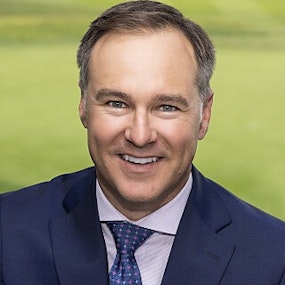
Immelman, Trevor
Golf Professional and Broadcaster
Trevor Immelman joined CBS Sports in December 2019 as a tower analyst for GOLF ON CBS coverage and was named as the network’s fifth lead golf analyst following the 2021-2022 PGA TOUR season.
Originally from South Africa, Immelman competed professionally for two decades on multiple professional tours, including the PGA TOUR, DP World Tour, and the Sunshine Tour. An 11-time winner worldwide, Immelman earned Rookie of the Year honors on the PGA TOUR in 2006, and two years later won the 2008 Masters Tournament.
Immelman competed as a player on two Presidents Cup teams (2005, 2007), and served as Vice Captain of the International team at the 2019 Presidents Cup. Most recently, he captained the International team at the 2022 Presidents Cup at Quail Hollow Club (Charlotte, N.C.).
New to FORE the Good of the Game?
Here are some great episodes to start with. Or, check out episodes by topic.















